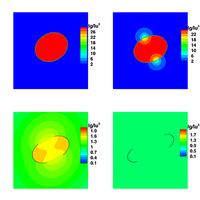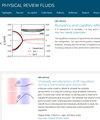胶囊悬浮液的粘度:内外粘度比和胶囊破裂释放的影响
IF 2.5
3区 物理与天体物理
Q2 PHYSICS, FLUIDS & PLASMAS
引用次数: 0
摘要
本研究采用浸入式边界晶格玻尔兹曼法探讨了胶囊悬浮液在胶囊破裂和聚合物释放过程中的粘度变化。在胶囊破裂过程中,粘度的变化分为三个阶段:变形阶段、破裂阶段和稳定阶段。在聚合物释放过程中,出现了两个新的粘度变化阶段:扩散阶段和稀释阶段。此外,我们还研究了粘度比 (λ) 对粘度的影响。我们发现,有效粘度随 λ 的增大而增大,当 λ 非常大时,有效粘度接近固体颗粒极限,这反映了胶囊形状的类似行为。最后,建立了悬浮液粘度与 λ、毛细管数 (Ca) 和体积分数 (ϕ) 相关的可用定律。这项研究成果有望应用于石油勘探和胶囊运输等领域。本文章由计算机程序翻译,如有差异,请以英文原文为准。

Viscosity of capsule suspensions: Effects of internal-external viscosity ratio and capsule rupture release
This work explores the variation of viscosity of capsule suspension during the process of capsule rupture and polymer release using the immersed-boundary lattice Boltzmann method. The variation of viscosity is classified into three stages in the rupture process: the deformation stage, the rupture stage, and the stable stage. In the process of polymer release, two new stages of the variation of viscosity emerge: the diffusion stage and the dilution stage. Furthermore, the influence of viscosity ratio () on the viscosity is investigated. We find that the effective viscosity grows with and approaches the solid particle limit for very large , reflecting a similar behavior in the capsule shape. Finally, an available law that relates suspension viscosity to , capillary number (), and volume fraction () is established. The findings of this research have potential applications in fields such as oil exploration and capsule transportation.
求助全文
通过发布文献求助,成功后即可免费获取论文全文。
去求助
来源期刊

Physical Review Fluids
Chemical Engineering-Fluid Flow and Transfer Processes
CiteScore
5.10
自引率
11.10%
发文量
488
期刊介绍:
Physical Review Fluids is APS’s newest online-only journal dedicated to publishing innovative research that will significantly advance the fundamental understanding of fluid dynamics. Physical Review Fluids expands the scope of the APS journals to include additional areas of fluid dynamics research, complements the existing Physical Review collection, and maintains the same quality and reputation that authors and subscribers expect from APS. The journal is published with the endorsement of the APS Division of Fluid Dynamics.
 求助内容:
求助内容: 应助结果提醒方式:
应助结果提醒方式:


